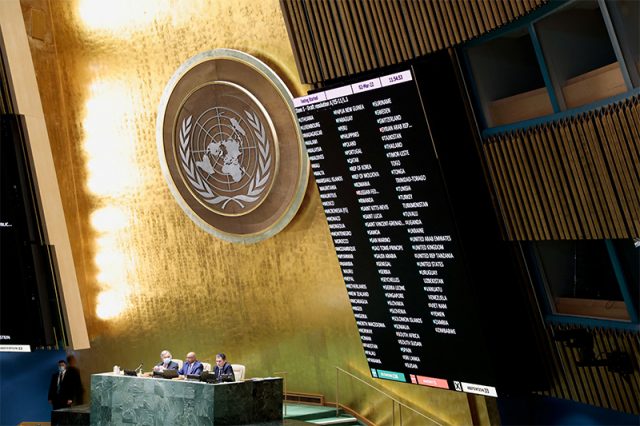
The United Nations charter, the welfare of Filipinos and other consequences of war were seen as the reasons why the Philippines took a stand over Russia’s military aggression in Ukraine’s territory.
Earlier this week, the Department of Foreign Affairs issued a statement of condemnation of Russia’s actions.
In the statement on February 28, the Philippines voted in favor of the UN General Assembly resolution raised at an emergency session on the ongoing crisis.
“Mr. President, the Philippines votes Yes to the UNGA resolution and expresses explicit condemnation of the invasion of Ukraine,” the DFA said.
The department does not mention Russia but chooses the stronger term “condemn” instead of “deplore.” It also stated:
“We appeal for the protection of civilians and civilian infrastructures. We strongly urge the cessation of hostilities; but while an offense can be stopped at will, the defense cannot rest until the offense stops.”
It cited the 1982 Manila Declaration on the Peaceful Settlement of International Disputes as means to “halt the ongoing tragedy for a while.”
The Philippines’ response came more than a week after Russia formally launched military operations to Kyiv, Ukraine’s capital, and other cities.
Why neutrality was not the option
The UN charter
The Philippines, Ukraine and Russia are all member-states of the UN since 1945.
Under Article 1 of the UN charter or the organization’s treaty, member-states have the following purpose:
“To maintain international peace and security, and to that end: to take effective collective measures for the prevention and removal of threats to the peace, and for the suppression of acts of aggression or other breaches of the peace, and to bring about by peaceful means, and in conformity with the principles of justice and international law, adjustment or settlement of international disputes or situations which might lead to a breach of the peace.”
Sen. Panfilo “Ping” Lacson argued at the CNN Philippines presidential debate on Sunday, February 27 that the Philippines ought not to remain neutral on Russia’s belligerence.
“Article 1 ng UN Charter, signatory tayo, kapag may aggressor dapat may pakialam tayo,” Lacson said.
“Di masama kung makisama tayo sa mga peace-loving nations para maging bahagi ang boses natin ng pagkondena kasi aggression talaga, invasion,” he added.
On Twitter, he added:
Philippines joins the United Nations General Assembly (UNGA) in condemning Russia’s invasion of Ukraine – I knew it was forthcoming because it was the right to do and the UN Charter says it. I was surprised the others in the CNN debate didn’t see it that way.
— PING LACSON (@iampinglacson) February 28, 2022
Effects on fuel prices
The current rising fuel prices in the global market are seen as collateral effects of the ongoing turmoil. This situation affects many countries in the world, including the Philippines. An immediate end to the conflict is thus in the Philippines’ and Filipinos’ best interests.
Vice President Leni Robredo, also a presidential candidate, stated this problem at the debate.
Moderators quizzed the candidates about their proposed strategies to cushion the possible impact of the invasion to the Philippines.
“Unang-una yung supply ng oil, siguradong maaapektuhan tayo nito…Meron tayong fuel subsidy, kailangan ang automatic suspension ang excise tax kasi yung mababawas nito sa presyo mga P10 per liter,” Robredo said as part of her response.
She was also among the candidates who did not raise their hands when asked if they agree on the country’s neutrality to the crisis.
Democratic principles
In voting to support Ukraine, the Philippines in effect affirms its commitment to “global freedom, democracy and rights” as well as chooses democracy over autocracy.
Manila-based ambassadors of 30 countries, in a joint statement, quote author and Holocaust prisoner Elie Wiesel:
“We must always take sides. Neutrality helps the oppressor, never the victims. Silence encourages the tormentor, never the tormented.”
The united stance also sends a clear message that Russia’s actions are “illegal, abhorrent, a blatant violation of the UN charter, a threat to global peace and security,” the diplomats say.
Loss of lives
Wars only result in unnecessary deaths and damage from both sides.
“Every nation should condemn Russia’s act of aggression against Ukraine. This senseless and unjustified war will cost more lives if it doesn’t stop,” one Twitter user said.
Some Filipinos also previously raised concerns over the welfare of Filipinos in the conflict areas. There are currently 141 Filipinos who are still in Ukraine.
READ: Filipinos talking about Russia-Ukraine conflict’s possible impact on Philippines
Sen. Koko Pimentel, head of the Senate foreign relations committee, said he agrees with the stance the Philippines made “for the sake of the children, women and elderly.”
“I agree that military operations must immediately be stopped by Russia and all others involved,” he said.
The vote does not necessarily take Ukraine’s side in its application for NATO membership, which is another matter altogether, Pimentel suggested.
National security
There are also those who raised concern that larger powers like China might be encouraged by Russia’s military encroachment and further flout international law if it finds the world’s pressure on Russia weak.
Writing for The Diplomat, Southeast Asia columnist David Hutt explains:
“Southeast Asian governments ought to be concerned that a major power thought it could so blatantly undermine national sovereignty, even in the face of a united Western response. How can the Vietnam, Malaysia, or the Philippines not see this as a major threat to the international order – and, indeed, directly undermine their belief that international law will protect their own sovereignty?”
Hutt also believes that Europe and the United States will take note of whatever position Manila will take on the conflict. “Remembered, indeed, the next time Vietnamese or Filipino or Indonesian vessels are harassed in the South China Sea. Times of crisis are when allies are revealed,” he added.









